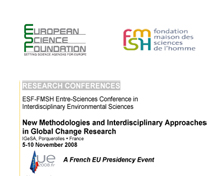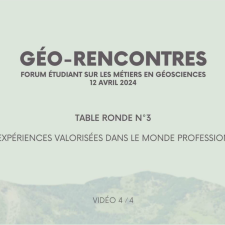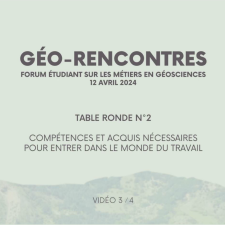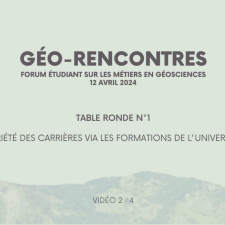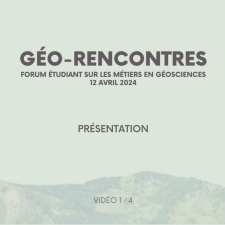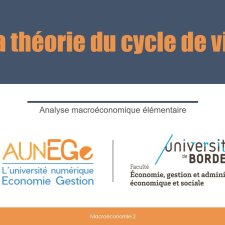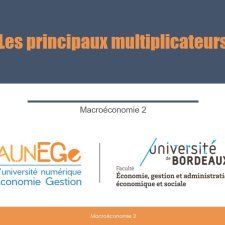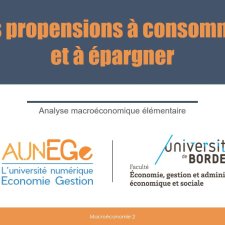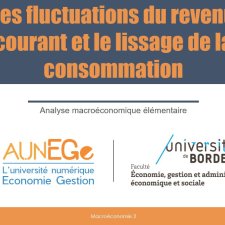Chapitres
Notice
Long Term Climate Variability: from Past to Future and from Data to Models
- document 1 document 2 document 3
- niveau 1 niveau 2 niveau 3
Descriptif
Data show that climate has always changed in the past, sometimes with a larger amplitude than what we experimented for two decades. But the main signatures of the anthopogenic forcing are the speed of the change and its globality. Paleodata at different scales are used to test the realism of climate model simulations and then their ability to simulate climates very different from the present one. They are used also to test impact models for water, forest resources. This talk aims to illustrate how paleoclimatology can bring a lot to global change studies, because it privileges interdisciplinary approaches.
Dans la même collection
-
Comparison of Simulated Tree-Ring Cellulose d180 at the European Scale
DanisPierre-AlainIn order to investigate factors involved in the inter-annual variability of d180 in tree ring cellulose (d18OTRC), we simulated the d18OTRC from 1960 to 2001 over Europe. We used 1) simulated climate
-
Borehole Climatology and Model Simulations: Steps to Integrated Assessment
Gonzales RoucoJesus FelipeProgress in understanding climate variability through the last millennium leans on simulation and reconstruction efforts. Exercises blending both approaches present a great potential for answering
-
Food demand, Productivity Growth and the Spatial Distribution of Land and Water use: A Global Model…
PoppAlexanderNowadays, human society appropriates about one quarter of total net primary production of the terrestrial biosphere. Production of food, energy and materials, and the related use of land and water
-
Turning Hazards into Ressources? Climate Change, Floods and Coastal Wetlands in the Costa Brava (No…
Serra-LlobetAnnaAccording to the IPCC Fourth Assessment, one of the most vulnerable areas in Europe are coastal zones. This is due to sea level rise combined with increased risks from storms. Coastal wetlands, in
-
Debate
HourcadeJean-CharlesSomervilleRichardSvedinUnoDuvalRomainThe European Science Foundation (ESF) and the French Foundation of the Maison des Sciences de l’Homme (FMSH) (within the Entre-Sciences programme) have agreed to jointly develop a new conference
-
Climatic Hazard Mitigation Through Risk and Resilience Committees in Nepal
Raj AryalKomalNepal lies in an ecologically fragile and seismic region with a history of devastating Glacier Lake Outburst Flood (GLOF), landslides and earthquakes. Increases in temperature could increase the
-
Climate Models: learning from the Past Long-Term Climate Variability
JoussaumeSylvieProjections of future climate change rely on global climate models. Such models simulate the dynamics and physics of the coupled atmosphere-ocean system and move towards models of the full Earth
-
Data-Model Fusion Approach in Global Change Research: Recent Development and Future Challenges
PengChanghuiIt is increasingly recognized that global change research requires methods and strategies for combing process models and data in systematic ways. This is leading to research towards the application of
-
The Largest Lakes and reservoirs of Russia as a Priority Water Ressource for Society
LemeshkoNataliaGlobal change for the last 25 years drives to important changes in hydrometeorological regime in different regions, reflecting water resources change of the larges reservoirs and lakes of Russia and
-
Present-Day Geomorphological Changes in Polar Regions
ZwolińskiZbigniewThe landscape uniqueness of polar zone manifests itself in morphological traces of older glaciations and marine transgressions, areas of present-day glaciations, multi-year permafrost, multi-year snow
-
The Sustainability of Kyoto's Architecture: Where Did the Victims of Climate Change Go?
DupuisJohanncept of “expropriation” in the case of territories exposed to a rise in sea levels. The premise of my project is that although future generations in all countries will be affected by climate change,
-
IPCC Working Group II
ChanzyAndréThe European Science Foundation (ESF) and the French Foundation of the Maison des Sciences de l’Homme (FMSH) (within the Entre-Sciences programme) have agreed to jointly develop a new conference
Avec les mêmes intervenants et intervenantes
-
Debate
BergerA.GuiotJoëlMannMichael E.DanisPierre-AlainAmatoVincenzoThe European Science Foundation (ESF) and the French Foundation of the Maison des Sciences de l’Homme (FMSH) (within the Entre-Sciences programme) have agreed to jointly develop a new conference
-
Conference Opening
GuiotJoëlLauberVolkmarThe European Science Foundation (ESF) and the French Foundation of the Maison des Sciences de l’Homme (FMSH) (within the Entre-Sciences programme) have agreed to jointly develop a new conference
Sur le même thème
-
Géo-Rencontres 2024 / Les expériences valorisées dans le monde professionnel
LilloEmmaAraujoJulieHuartFlorianDubreuRomainBuquetDamienChazalLauraBorieMarianeForum sur les métiers en géosciences organisé par les étudiants du CMI Ingénierie Géologique et Civile, Université de Bordeaux, 12 avril 2024
-
Géo-Rencontres 2024 / Compétences et acquis nécessaires pour entrer dans le monde du travail
BrinonJulietteAmoleFili-FenuaPretouFrédéricCampetHugoLiébauxAlbinDe AlemeidaMarie-LouPoirierAymericDufrenoyAudreyForum sur les métiers en géosciences organisé par les étudiants du CMI Ingénierie Géologique et Civile, Université de Bordeaux, 12 avril 2024
-
Géo-Rencontres 2024 / Variété des carrières via les formations de l'université
InguimbertDianeLacazeRomaneLemaitreLaurieChazalLauraMontjeanPascalPoudevigneJacquesPortefaixFrédéricForum sur les métiers en géosciences organisé par les étudiants du CMI Ingénierie Géologique et Civile, Université de Bordeaux, 12 avril 2024
-
Géo-Rencontres 2024 / Présentation
LatasteJean-FrançoisLavieThéoForum sur les métiers en géosciences organisé par les étudiants du CMI Ingénierie Géologique et Civile, Université de Bordeaux, 12 avril 2024
-
Tokyo, plus grande « ville » au monde : aménager et gouverner la démesure
Languillon-AusselRaphaëlAvec ses quelques trente-cinq millions d’habitants, Tokyo est la « ville » la plus peuplée au monde, et l’une des métropoles les plus riches. Cette présentation vise à décrire, analyser et expliquer,
-
Demande en biens et services et fluctuations conjoncturelles
Maveyraud-TricoireSamuelDemande en biens et services et fluctuations conjoncturelles
-
-
-
Les propensions à consommer et à épargner
Maveyraud-TricoireSamuelLes propensions à consommer et à épargner
-
Le marché des biens et services à court terme
Maveyraud-TricoireSamuelLe marché des biens et services à court terme
-
Les fluctuations conjoncturelles de l’activité
Maveyraud-TricoireSamuelLes fluctuations conjoncturelles de l’activité
-
Les fluctuations du revenu courant et le lissage de la consommation
Maveyraud-TricoireSamuelLes fluctuations du revenu courant et le lissage de la consommation


